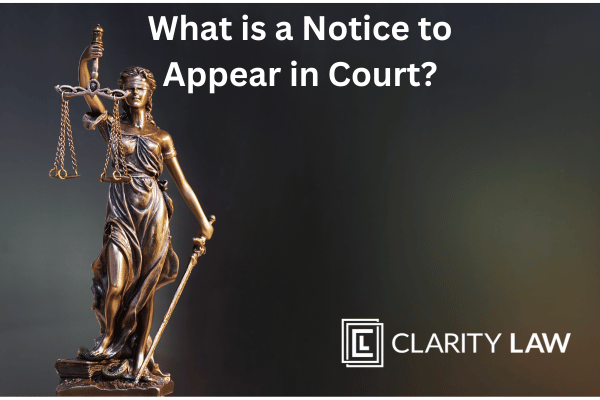
In Queensland, criminal proceedings can be commenced in one of three ways:
- Arrest and bail (or remand in custody);
- Complaint and summons; and
- Notice to Appear.
The last of these is the most common way for police to start criminal proceedings against someone. If you have been given a Notice to Appear in Court by the police, it is important to understand what it is and how it operates within the larger context of Queensland’s criminal law and procedure.
Notice to Appear as an Alternative to Arrest and Bail
Prior to the creation of Notices to Appear, the conventional way for police to start criminal proceedings against someone was by either (a) arrest and bail / remand in custody, or (b) complaint and summons. The former process involved taking the charged person into custody, formally charging them, then considering whether to grant them “watchhouse” bail, or keep them in custody until their matter finalised at court (unless a Magistrate or the Supreme Court granted bail in the meantime).
The ”complaint-and-summons” process did not require formal arrest. Instead, the charged person was issued with a “complaint” outlining the offence they were alleged to have committed, and a “summons” directing them to attend court. If the person was charged with more than one offence, these had to be described on separate complaints (with some exceptions). The legislation concerning complaints are detailed, and the requirements of complaints are strict. Summonses are issued by magistrates; therefore, the police required a magistrate to issue a summons prior to providing these documents to the charged person.
These processes – arrest and bail / remand and complaint and summons – were both cumbersome. The former required taking person into custody. The latter was time-consuming. Notices to Appear were developed as a way of preventing taking people into custody (especially for offences that are highly unlikely to result in imprisonment on sentencing) and to streamline the process of commencing proceedings.
Commencing Criminal Proceedings by Notice to Appear
Police may issue a Notice to Appear to a person whom the police consider to have committed an offence. Notice to Appear must be given to the person directly, unless they are charged with an offence under the Road Use Management Act or the Heavy Vehicle National Law (Queensland). In these circumstances, the person can be served a Notice to Appear by registered post.
In order to be valid, the Notice to Appear need only state the “substance” of the offence alleged to have been committed. It must also have the accused person name on it, state whether they are an adult or a child, list the court in which they are to appear (and the time and date of the first appearance), have the charging police officer’s name on it, and be signed by a police officer.
Note that the requirement for the Notice to Appear to only state the “substance” of the offence charged is a less strict requirement than complaints, which must use the exact wording of the offence as set out in the legislation. Also, no objection can be made if more than one charge is listed in a single paragraph on the Notice.
The prosecution may provide proper particulars of the offence (usually on a Bench Charge Sheet) on the first court date.
Once the Notice to Appear is issued, a copy of it must be given to the clerk of the court in which the charged person is to appear as soon as possible.
Once the Notice to Appear is served, and a copy given to the clerk of the court, the Notice is treated the same as a complaint and summons and the matter proceeds before the court as though it was started by a complaint and summons.
Lastly, it must be noted that Notices to Appear as a method of commencing criminal proceedings are only available to the Queensland Police Service. Other government agencies (such as the Australian Tax Office, the Commonwealth Director of Public Prosecutions, local councils, etc) must still commence by means of a complaint and summons.
Failure to Attend Court after a Notice to Appear is Served
If you are served with a Notice to Appear, and you do not attend court on the date stated on the Notice, the magistrate may issue a warrant for your arrest. Once the warrant is issued to the police, they will take you into custody, and provide you with a new court date. Alternatively, if you surrender yourself to the court, the magistrate may revoke the warrant and return the criminal charges to the court’s list.
On the other hand, if the police failed to properly serve the Notice to Appear on you or failed to give a copy to the clerk of the court, the magistrate may dismiss the charges which relate to the Notice. However, that does not end the matter, as the police may re-issue the Notice to Appear with a new court date. Re-issuing the Notice returns the charges to the court.
Conclusion
The purpose of Notices to Appear is to streamline and simplify the process of starting criminal proceedings. Although Notices are a less cumbersome process than arrest and bail or issuing complaints and summonses, this does not mean that the legal consequences of being dealt with by a Notice are any less serious. If you have been served with a Notice to Appear, it is important to get expert legal advice as soon as possible.
How do I get more information or engage you to act for me?
If you want to engage us or just need further free information or advice then you can either;
-
Use our contact form and we will contact you by email or phone at a time that suits you
-
Call us on 1300 952 255 seven days a week, 7am to 7pm
-
Click here to select a time for us to have a free 15 minute telephone conference with you
-
Email the firms founder on This email address is being protected from spambots. You need JavaScript enabled to view it.
We are a no pressure law firm, we are happy to provide free initial information to assist you. If you want to engage us then great, we will give you a fixed price for our services so you will know with certainty what we will cost. All the money goes into a trust account monitored by the Queensland Law Society and cannot be taken out without your permission or until we are legally allowed to.






